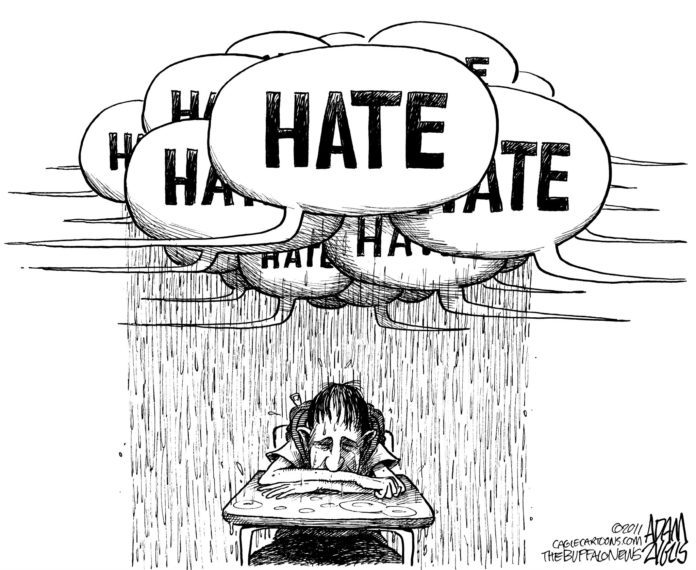BY CHARLES C. HAYNES
Culture wars are returning to school this fall as conflicts over what to say – or not to say – about homosexuality escalate across the country.
After a spate of high-profile media stories about gay teen suicides [nationwide, six in September alone], school officials are caught in the crossfire in the fight over how to address the anti-gay bullying that has been implicated in some of the deaths.
Gay rights advocates insist that anti-bullying policies must include positive treatment of lesbian, gay, bisexual and transgender [GLBT] people. Christian conservatives support anti-bullying efforts in general, but demand that public schools keep silent about sexual orientation.
As with other deeply divisive social conflicts in America today, winners and losers are often determined by the red-blue state divide. In blue-state California, for example, schools are now implementing a new law that requires inclusion of GLBT Americans in teaching social studies.
Meanwhile in red-state Tennessee, the state Senate passed and the House is considering a law that would bar teachers from discussing homosexuality with elementary and middle school students – dubbed the “don’t say gay” bill by opponents.
For a case study of how this fight plays out on the local level, consider the current debate in Anoka-Hennepin School District, Minnesota’s largest school system [which gets national media attention partly because much of it is in Michele Bachmann’s congressional district].
Although Anoka-Hennepin school officials claim to be taking measures to stop bullying, six students filed suit in July charging that the district has failed to address persistent and widespread harassment of GLBT students. The U.S. Department of Justice is also investigating complaints about anti-gay bullying that allegedly goes unchecked by district staff.
Eight students in the district have committed suicide in the past two years – at least four of them reportedly struggled with issues of sexual identity.
Advocates for gay students argue that district policy banning discussion of GLBT issues in the curriculum – and requiring staff to be “neutral on matters regarding sexual orientation” – marginalizes gay students and contributes to the hostile environment they experience each day.
The Minnesota Family Council and other conservative Christian groups defend the silent treatment, arguing that bullying can be adequately addressed without discussion of GLBT issues. In their view, inclusion of sexual orientation in anti-bullying policies will be used by gay activists as a gateway for promotion of homosexuality in schools.
But as Anoka-Hennepin schools are learning the hard way, silence doesn’t work. GLBT students aren’t going anywhere – and they are no longer content to be invisible or harassed. School districts that fail to take anti-gay bullying seriously can expect to be sued.
Finding common ground on this issue won’t be easy, although the fact that all sides want safe schools is a good starting point. Surely there must be ways for schools to uphold the worth and dignity of all students – including LGBT students – while simultaneously acknowledging that Americans are divided about homosexuality.
Consider, for example, that many high schools now have student-initiated Bible clubs as well as Gay-Straight Alliances. The role of school officials is to let the voices be heard by ensuring a safe learning environment for members of both groups. By focusing on teaching students to address differences with civility and respect, schools can become places that are both safe and free.
A safe school is free of bullying and harassment. And a free school is safe for student speech even about issues that divide us.
Anoka-Hennepin school officials insist they are making changes to ensure that GLBT students are not bullied with impunity. But these changes, as welcome as they are, will come too late for the family of 15-year-old Justin Aaberg, a student at Anoka High School who committed suicide last year.
Justin, his family would later learn, had been taunted and harassed because of his sexual orientation. Justin’s mother believes that the district’s refusal to address LGBT issues helped create a hostile school climate for her son and others – and she now campaigns to break the silence in the schools.
When the culture war prevents inclusion of sexual orientation in anti-bullying policies, silence can equal death.
– Charles C. Haynes is director of the Religious Freedom Education Project at the Newseum, 555 Pennsylvania Ave., N.W., Washington, D.C., 20001. Web: firstamendmentcenter.org. E-mail: chaynes@freedomforum.org.








